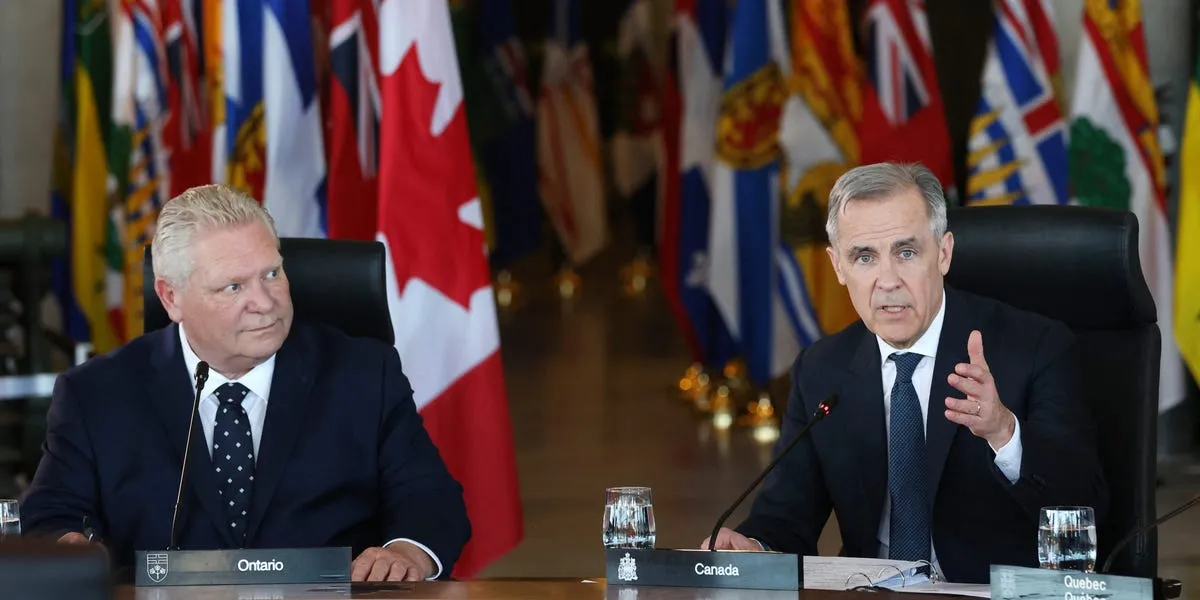
In a recent political episode that has captured the attention of Canadians, Ontario's Premier, Doug Ford, faced criticism for airing an anti-tariffs advertisement. This ad featured historical remarks from the late President Ronald Reagan, specifically from a speech in 1987 where he discussed tariffs. While Ford did not issue an apology for the ad, Canadian Prime Minister Mark Carney took a different approach, privately apologizing to President Donald Trump, leading to a widespread debate among Canadians on social media.
On Saturday, Prime Minister Carney revealed to reporters that he had apologized to Trump over the controversial ad, which aired during the early games of the World Series between the Toronto Blue Jays and the Los Angeles Dodgers. The ad provoked a strong reaction from Trump, prompting him to cancel trade talks with Canada. Carney stated, “I did apologize to the president,” acknowledging that Trump was offended by the advertisement. He further explained, “It's not something I would have done, which is to put in place that advertisement, and so I apologized to him.” This admission underscores Carney's responsibility as the Prime Minister to maintain a favorable relationship with the United States.
Despite the backlash, Premier Ford defended the advertisement, claiming it was the best ad they had ever produced and succeeded in initiating a conversation with the American public and their elected officials. Following the controversy, Ford eventually decided to withdraw the ad. The differing reactions from Carney and Ford have led to a polarized response from Canadians, highlighting the complexities of diplomatic relations in an era of heightened trade tensions.
The apology from Prime Minister Carney sparked a vigorous debate on social media platforms among Canadians. Many expressed surprise and disappointment at Carney’s decision to apologize, especially those who had supported him for his previously tough stance on Trump. Comments such as “elbows down” became popular among critics who felt Carney was backtracking on his earlier commitments to stand firm against the U.S. administration.
Some Canadians took to Reddit, particularly on the r/Canada forum, to process their feelings about the apology and the ad itself. One user from Prince Edward Island articulated their frustration, stating, “I don’t think PM Carney should have apologized for an ad that was truthful.” This sentiment echoed across various discussions, with many questioning why Canada should apologize for a factual representation of Reagan’s views on tariffs.
While some users criticized the ad's timing amidst ongoing trade negotiations, others argued that Carney's apology could serve as a strategic move to mend relations with Trump. A Redditor suggested that “by apologizing, he improved relations without giving up a single thing,” indicating a belief that maintaining good diplomatic ties with the U.S. is essential for Canada’s interests.
The fallout from Trump's tariffs and his earlier comments about wanting Canada to become the “51st state” have led to a surge in Canadian nationalism. Many Canadians have expressed intentions to boycott American brands in favor of supporting local businesses, reflecting a growing sense of pride in Canadian products. This shift in consumer behavior has been noted as an increasing trend in response to the ongoing trade challenges between the two nations.
As the situation develops, the implications of Carney's apology and the subsequent reactions from both politicians and the public will likely continue to unfold, shaping the future of Canadian-American relations.